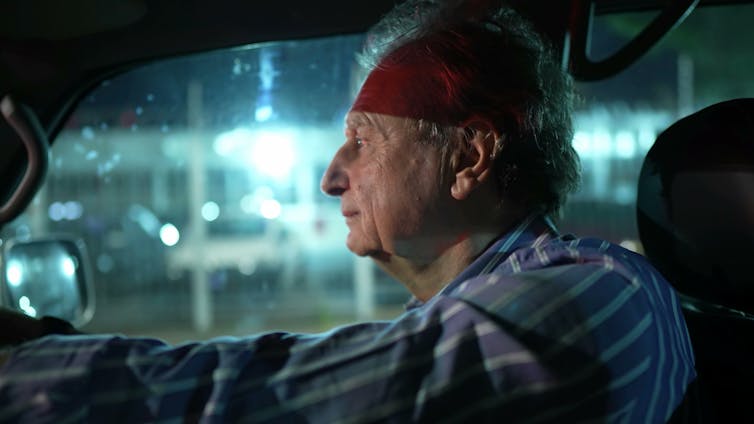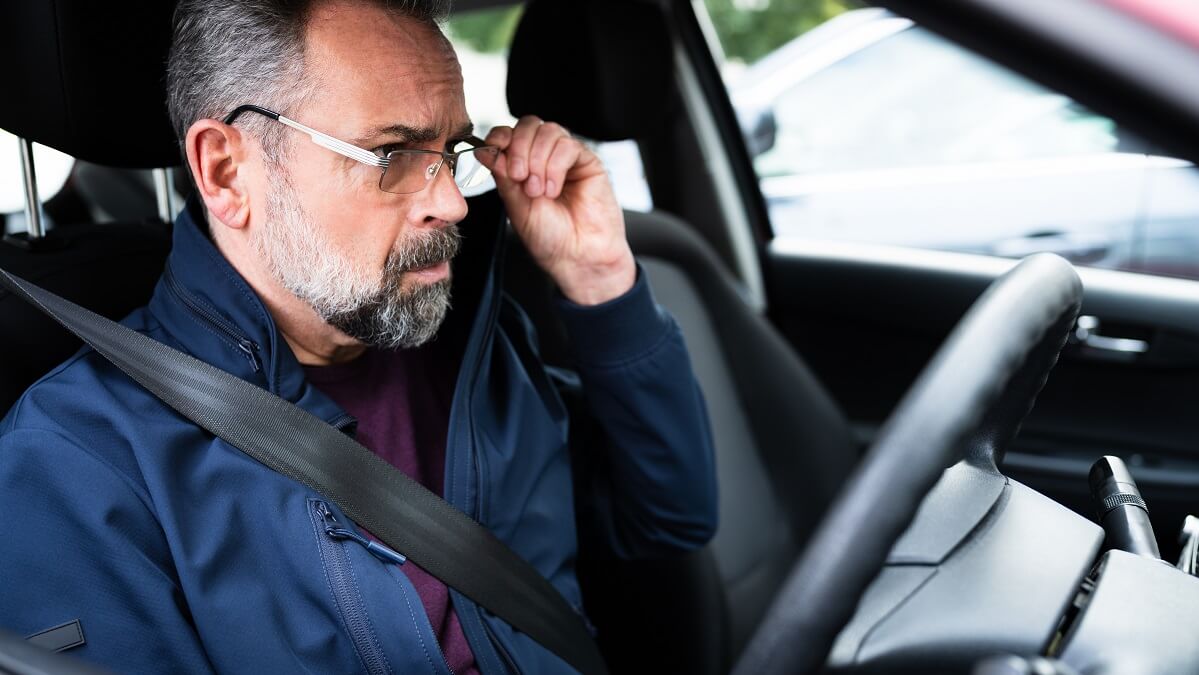Amie Hayley, Swinburne University of Technology
Australia is a nation of car owners with a rapidly ageing population. Drivers aged over 70 have nearly doubled in number in the past 20 years. The trend is the same for hospitalisations and fatalities due to crashes involving older drivers.
Ageing itself is not a barrier to safe driving. Even so, our ability to drive safely can become compromised as we get older. It can be difficult to know what to do if you have concerns about someone’s driving.
So, how can we ensure ageing family members and friends are safe on the roads? And should regular assessment of drivers over a certain age be mandatory? Some states and territories require it, others don’t.
What affects our ability to drive safety?
Driving is a complex task. A driver must be alert and respond quickly to any changes, especially in an emergency.
Substance usage, fatigue and distraction all affect a person’s ability to drive safely. So, too, do many of the changes that happen with advancing age.
Declining mobility, eyesight or hearing can impact some of the more obvious skills needed for safe driving. This might include the ability to turn and check mirrors, or to hear other vehicles. Advancing age can also lead to a decline in more hidden skills of safe driving, including our ability to plan effectively, think quickly and react appropriately.
Many older people are able to keep driving safely, though, and recognising the signs of a potential problem can be tricky. However, there are practical steps individuals, families and friends can take to ensure the safety of older drivers and other road users.

Shutterstock
What rules apply around Australia?
Licensing requirements for senior drivers vary a lot among Australian states and territories.
Broadly speaking, drivers aged 75 years and older must have a medical assessment each year to keep their licence in New South Wales, Queensland, Western Australia (over 80) and the ACT. In Tasmania senior drivers are asked to volunteer information about any conditions that might negatively affect their driving.
People can drive freely up to any age in South Australia, Victoria and the Northern Territory. It’s up to the individual to ensure they’re medically safe to drive.
So, do these differences between states have a major impact on the safety of older drivers? Not really. Some early research showed older drivers in jurisdictions with more stringent rules (such as NSW) were no less likely to be injured or killed in a traffic crash than people in states with voluntary reporting requirements (such as Victoria).
This finding points to the need for multi-tiered – rather than simply age-based – assessment for identifying older at-risk drivers. It requires the involvement of a range of health practitioners in more elaborate types of assessment.
Despite these differences in rules and regulations, a common theme is to ensure a person can drive safely, independently and legally. Exactly what that means, and how it is evaluated, is decidedly less clear.
How do you know if someone is safe to drive?
There is no standard way to test a person’s fitness to drive.
National driver medical guidelines outline minimum standards that people should meet to be considered medically safe to drive. The guidelines do not outline how medical safety is assessed nor how we can help older people recognise the signs of declining driving ability. They also do not provide advice on exactly what tests can be used.
Requiring older drivers to complete an advanced driving test (such as on a closed track) would clearly show whether they are fit to drive. However, these tests are very costly, impractical and difficult.
Cognitive screening tests are a practical stand-in solution to test for a decline in many functions needed for driving, such as vision, cognition and motor abilities. The tests range in difficulty from the simpler pen-and-paper clock drawing or the trail-making test, which can be done at home, to the more complicated Montreal Cognitive Assessment. While these tests are not able to diagnose medical disorders, they reliably indicate whether a person has dementia.
A recent study in Japan found a decrease in motor vehicle collisions after a cognitive screening test became mandatory during licence renewals for its relatively high proportion of drivers over 75. As this test also assessed whether they were likely to have dementia, it helped identify and remove the most impaired drivers. This approach might help provide a standard way to quickly identity Australian drivers who are most at risk.
Not being able to drive also has impacts
For many older Australians, having a driver’s licence provides a critical link between health outcomes, mobility and social connectedness. It’s worth noting the Japanese study found cycling and pedestrian injuries increased in the age group affected by mandatory cognitive testing. This was attributed to the enforced change in their options for getting around.
Therefore, determining whether an older person is fit to drive should involve proactive conversation, with the goal of enabling them to keep driving for as long as it is safe.
Some easy ways to help older drivers remain confident and safe include:
- planning trips in advance
- driving in daytime only
- avoiding peak-hour traffic
- getting regular check-ups that test sight, hearing and mobility.

Shutterstock
Another thing to consider is that older drivers are more likely to drive old vehicles that lack the technology that keeps us safe before, during and after a crash. Choosing a vehicle that provides the best protection makes a difference – drive the safest one you can afford.
If driving has become too difficult or unsafe, it is important that family and friends help with the transition from driving. There’s a need to consider how life can best continue as normal without the use of a vehicle. This might involve conversations about how to access community services and other ways of getting around, whether public or private transport.
Advancing age does not always mean a loss of driving ability. Nonetheless, recognising warning signs will help all drivers safely use the roads. Regular health assessments that include cognitive screening tests, making proactive changes in driving practices and choosing the safest vehicle possible are all practical ways we can help ensure older drivers stay safe.
Amie Hayley, Rebecca L. Cooper Al & Val Rosenstrauss Fellow and Senior Research Fellow, Swinburne University of Technology
This article is republished from The Conversation under a Creative Commons licence. Read the original article.
Should older drivers be regularly assessed? Do you think it would improve road safety overall? Let us know what you think in the comments section below.


This article does not mention that in NSW drivers from the age of 85 have to take a physical driving test every two years, as well as providing the medical and optical information
Everyone is different, I’m 84 and still challenging my grandkids at go-karting and beating them. this keeps my reaction times good and keeps me aware of what is going on around me which is happening very quickly on a go-kart track. I got my driving licence in UK in 1957 and have never had an accident, a couple of close shaves with idiot red-light runners but saw them and hit the brakes. ACT has eyesight tests and a GP test to see if you have good reactions and no health effects that might be an issue driving such as narcolepsy or on medications that might slow your reactions.
In South Australia, those over 75 must have a medical certificate and eye test.
Another way to bash the seniors go back to your stat and check how many have actually caused the accidents and don’t forget that road deaths also include people that have been hit by a car, fallen over on the road and died. If you want to stop road accidents stop the younger generation from being able to purchase and drive cars that have more power than they can handle and these days that also includes small cars.
Senior drivers who some but not all have slower reaction times ,maybe poor eyesight ,unsteady movements also drive high powered cars both small and large that they possibly cannot handle .How many older drivers feet slip and they career into shop fronts etc .Not all younger drivers can be blamed
I live near a retirement village and I do believe that there are older people that do need to do a physical test, but in saying that there are plenty of drivers of all ages that should do physical tests, especially a advanced or defensive driving course. We have to be proactive and realize as we age that there will certainly come a time when the licence needs to be handed in – I know that will be a scary thing but we have to realize that it will happen. I’m finding younger females in small cars are especially scary when they drive – it is a generalization, but what I’ve observed myself.
Looking at the age of people involved in vehicular accidents it is plain to see that all ages are represented. As a 74 year old driver with 40+ years of driving experience I have been involved in 3 accidents in my driving time. All of these were caused by other drivers not obeying the road rules. I drive at the speed limit, do not speed, and am careful of the road signs and other road users. If everyone followed the rules there would not be so many accidents. Cyclists and motor cyclists also disregard the rules while complaining about car, truck and bus drivers. My message is, know the rules, obey them, care about your own safety and that of all other road users and there would be less misery due to vehicular accidents. Age has nothing to do with it, only ability to drive or ride whichever vehicle is your choice aware of the rules and safety.
I am 72 ears of age and I’ve been driving for 55 years now. I work as a Traffic Warden at a school crossing. I’ve had people try to run me over and these are not elderly drivers. These same drivers go through stop signs, do U Turns at no U turn signs and Turn right at No Right Turn signs. Once again these are not elderly drivers. I’ve even seen Learner Drivers and P Plate drivers do the above as well.
Sure there are elderly drivers that should not be driving but they are a minority when compared to Learners to full licenced drivers that constantly break the rules as above.
Lets not judge the elderly who obey the rules until the law breakers are brought under control
There is one driver you should watch very carefully and that is,
The one in front of the one behind you.
I’m 75 and have been driving for over 50 years. My observation is that the roads are crowded with drivers of all ages that have no idea how to drive and it’s getting worse. I’m sure that some do not know what indicators are for. On the basis that there is no such thing as an ‘accident’, which is another way of describing driver incompetence, more analysis of why an ‘accident’ happened is required and more policing of incompetent driving would go a long way to reducing ‘accidents’.
All tourist and migrant foreign license drivers should be subjected to a ‘driving test’ at least, and issued a permit to drive on Australian roads. There is a high percentage of these people not knowing what’s going on, on our roads. The ACT seem to be the only place that have thought about overseas drivers.
Can a tourist get a driver license in Australia?
Introduction. If you’re a temporary overseas visitor to NSW and you hold an overseas driver licence, you can apply for a NSW licence if you wish.19 Aug 2020
Can international tourists drive in Victoria?
If you’re visiting Victoria for less than six months you can drive on your overseas driver licence provided it is valid and current. If you’ve been living or will be living in Victoria for six months or more you’ll need to convert your overseas licence or permit to a Victorian licence.
Can I drive in Qld with international license?
If you’re visiting Queensland, you can drive if you have a valid interstate or overseas licence. If you move to Queensland, you will have to transfer your licence to a Queensland licence.
Temporary visitors, students and workers in South Australia
Students, visitors and those who are working in South Australia on current temporary visas are permitted to drive with an overseas licence as stated below only while that licence is current. If that licence expires, you are required to obtain a South Australian driver’s licence.
You can drive in Tasmania on your overseas licence if you are a visitor or hold a temporary Australian visa.
Visiting Drivers in the Northern Territory
In the Northern Territory a person is required to obtain a Northern Territory issued driver’s licence after three months or apply to be granted an exemption from holding a local licence if they wish to continue to drive.
Can I drive in Western Australia with a foreign license?
Visitors to WA can drive on their overseas licence, with no additional testing. This is widely followed throughout the world. Australia is a signatory to the 1949 Geneva Convention on Road Traffic. This provides the same arrangements for holders of an Australian driver’s licence when driving overseas.
When driving in the ACT a visiting driver must carry:
Your foreign driver licence written in English; or
Your international driving permit accompanied by your foreign driver licence; or
Your foreign driver licence that is not in English, accompanied by an official English translation of the licence. An official translation means a translation certified by an Embassy or Consulate or by a National Accreditation Authority For Translators and Interpreters (NAATI) or an Australian Institute of Interpreters and Translators (AUSIT) accredited translator.